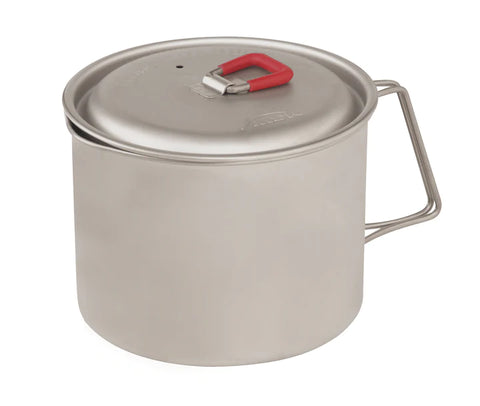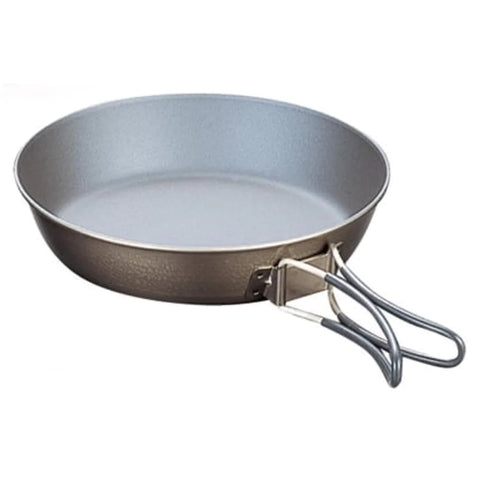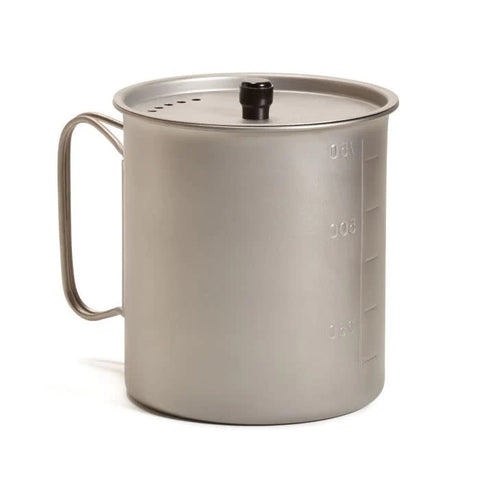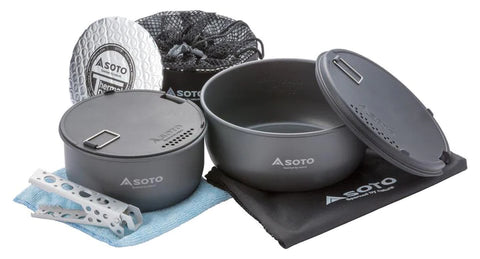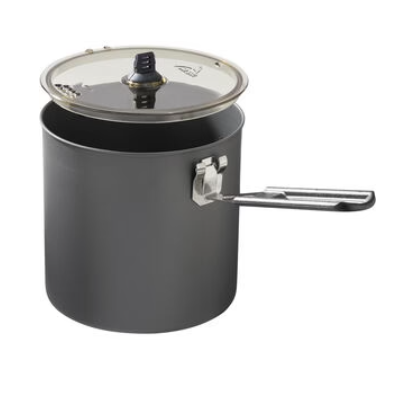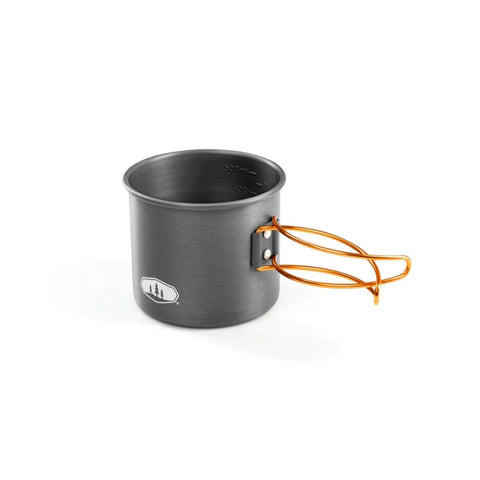Outdoor cookware is an essential part of any camping or outdoor adventure, and having the right cookware can make all the difference in your outdoor cooking experience.
When it comes to outdoor cookware, there are several materials to choose from, including titanium, aluminium, and stainless steel, each with its own advantages and disadvantages. Choosing the right one for you can absolutely transform your experience!
In this blog, we will explore all the differences between titanium, aluminium and stainless steel in outdoor cookware, including their pros and cons to help you decide which type of cookware is right for you.
Titanium Cookware:
Titanium cookware is one of the most popular choices for outdoor enthusiasts, and one of our personal favourites. It is incredibly lightweight, making it ideal for backpacking and hiking trips where every gram counts. Titanium is also highly durable and can withstand extreme temperatures, making it great for use on fires and stoves.
In terms of cleaning, titanium cookware is generally dishwasher safe, which makes it really easy to clean at home! I would always recommend checking with the manufacturer before doing so though, to avoid damaging your cookware in any way.
Additionally, titanium cookware is non-reactive, meaning that it will not affect the taste of your food.
One of the downsides of titanium cookware that we recognise is that it can be expensive. However, this cost is justified by its durability and lightweight nature. Another downside is that titanium does not conduct heat as well as some other materials. This means it can take longer to heat up and cool down.
Summary
Pros: Lightweight, durable, withstands extreme temperatures, non-reactive, generally dishwasher safe.
Cons: Expensive, less heat conductive than other materials.
Some great examples of titanium cookware available at Valley and Peak including the following:
EVERNEW Titanium NS Frypan 6.5"
Vargo Titanium Ti-Lite 750 Mug/Cook Pot
Aluminium Cookware
Aluminium cookware is another popular choice for outdoor cookware. It is affordable, lightweight, and is a great heat conductor and distributes the heat evenly. This makes it ideal for cooking a variety of foods quickly, whilst also having a fantastic strength to weight ratio.
Because aluminium is fantastic at transferring heat quickly, less fuel will be needed when cooking. This makes it a great choice for those who need to shed weight and to move on quickly.
A downside of aluminium cookware is that it is not as durable as some other materials. It can scratch and dent more easily, and it can also react with acidic foods, such as tomatoes or vinegar. This can cause a metallic taste. However, many manufacturers now offer aluminium cookware with a non-stick coating, which can help prevent these issues.
Furthermore, aluminium is not dishwasher safe, and so therefore should always be washed by hand.
Summary
Pros: Affordable, lightweight, efficient, good heat conductor, non-reactive (when coated in non-stick finish).
Cons: Not as durable as other materials, reactive (when not coated), not dishwasher safe.
Brilliant aluminium cookware available at Valley and Peak:
GSI Halulite 20fl oz Aluminium Bottle Cup
Stainless Steel Cookware:
The final cookware material choice often chosen by outdoor enthusiasts is stainless steel. This material is highly durable, and the toughest of the three options. This makes it great for those who will be using their cookware often.
Stainless steel can also withstand high temperatures, so it is great for cooking on a flame, conducts heat well, and is non-reactive, so again it will not affect the taste of your food.
The durability of stainless steel also means that it is usually always dishwasher safe. As mentioned previously though, it is also best to check with the manufacturer before putting anything in your dishwasher.
One of the cons of stainless steel cookware is that it is heavier than some other materials. This makes it less ideal when gram counting for backpacking and hiking trips. Additionally, stainless steel can be prone to hot spots, which can cause uneven cooking.
Furthermore, although stainless steel is highly durable and corrosion-resistant, it is possible for it to rust. Therefore, thoroughly cleaning and drying your stainless steel cookware after each use is essential to preventing rust, as well as avoiding leaving it in wet environments for extended periods.
Summary
Pros: Durable, withstands high temperatures, conducts heat well, non-reactive, dishwasher safe.
Cons: Heavier than other material options, prone to hot spots, possible to rust.
A fantastic cook and eat set that features all three of the above mentioned materials is the SOTO Thermostack Combo. This has been carefully crafted to select each material for their strongest qualities.
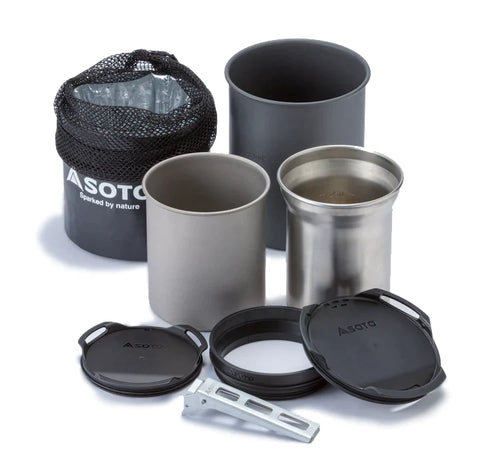
Conclusion:
In conclusion, your choice of outdoor cookware ultimately comes down to personal preference and intended use.
Our own recommendations for each of the cookware materials discussed are the following:
- For when every gram counts: Titanium cookware
This is due to its lightweight and durable properties. Although this is the most expensive material, titanium is the best for keeping pack weight down whilst also providing excellent quality.
- For those looking for the best cooking quality: Aluminium
More affordable, but still lightweight, aluminium has the ability to cook more temperature sensitive foods such as eggs, as well as being fantastic for cooking meals with fresh food.
- For those in need of durable cookware: Stainless steel
Stainless steel has an immense durability and scratch resistance nature, making it perfect for those needing cookware that will last for a long time. However, stainless steel is the heaviest of these three options and will therefore add more to your overall pack weight.
FAQ:
What does heat conductivity mean and why is it important?
Heat conductivity, in terms of cookware, is used to describe how efficiently the material can absorb and distribute heat energy from the heat source to the food being cooked. Cookware with high heat conductivity can heat up quickly and evenly, reducing hot spots and preventing food from burning or sticking.
How well a material is able to conduct heat is also linked to its ability of retaining heat. Cookware made of highly conductive materials, such as aluminium, tend to heat up quickly but also cool down quickly once removed from the heat source. Cookware made of less conductive materials, such as stainless steel, may take longer to heat up but tend to retain heat for longer periods, keeping food warm even after being removed from the heat source.
Why are copper cores not used in camping cookware?
Copper core is not commonly used in camping cookware mainly due to weight and cost. Because copper is so heavy, it’s not a practical choice for most camping and outdoor activities, when weight is an important factor when planning a trip. Furthermore, copped is one of the most expensive materials used in cookware, which would lead to outdoor cookware being less accessible to many if it were to be used.
Does aluminium cookware require seasoning?
Some types of aluminium cookware, such as cast aluminium, may benefit from seasoning by preventing food sticking and making it easier to clean. However, not all aluminium cookware requires seasoning, and you should check the manufacturer's instructions beforehand to ensure that it is safe to do so.
It is also important to note that non-stick coatings on aluminium and other types of cookware should not be seasoned as this can damage the coating and make it unsafe to use.


